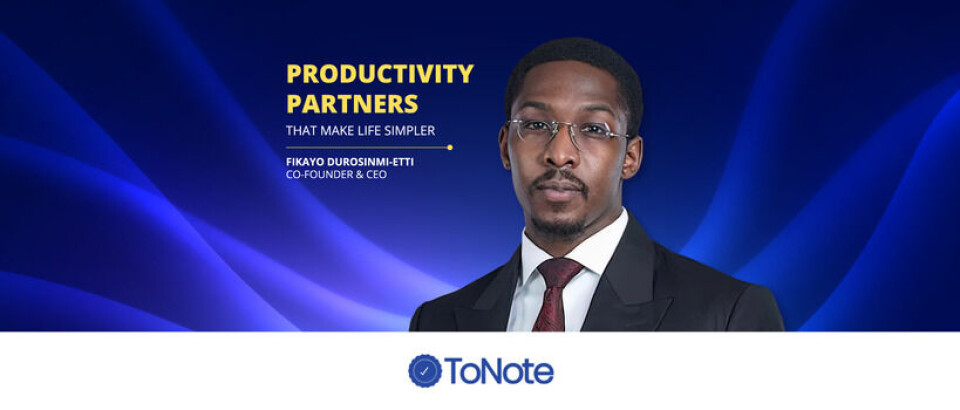Copyright : Re-publication of this article is authorised only in the following circumstances; the writer and Africa Legal are both recognised as the author and the website address www.africa-legal.com and original article link are back linked. Re-publication without both must be preauthorised by contacting editor@africa-legal.com
Productivity partners that make life simpler

There’s no need to fear legaltech, says Fikayo Durosinmi-Etti who spoke to Craig Sisterson about the way legislative frameworks that embrace legal technology help build trust.
Lawyers in Africa and throughout the world need to move away from the misconception or “complete myth” that legal technology could potentially replace their roles, says Fikayo Durosinmi-Etti, CEO and co-founder of ToNote, a technology startup based in Lagos.
“Technology empowers and assists legal practitioners so that you can be your most productive self,” commented Fikayo. “It’s basically supposed to be a productivity partner. When you look at legal technologies, they aim to make your life easier, they aim to take care of all the mundane tasks so you can focus on the things that you’re really billing for. So I think people need to move away from any fear in general and look to some of the opportunities.”
Fikayo believes such opportunities are only likely to grow, with most governments across Africa looking to include digital transformation as part of their economic growth strategies. This was illustrated in the recent Nigerian elections, where many aspiring candidates spoke strongly about digitisation. “It’s a key part of building a sustainable and upwardly mobile economy,” Fikayo emphasised.
As part of the move towards a paperless future for the African legal industry, ToNote began as a pilot for electronic signatures and digital, remote notary services just after the pandemic. Since then it has grown into a hybrid platform operating predominantly in Nigeria, and skeletally in Kenya, Ghana and the United States. Fikayo’s team is working on a fully automated electronic signature and online notary platform which aims to revolutionise legal documentation in Africa.
One challenge for legaltech providers, he noted, is that it’s not just about having a great product. “It’s also about altering years and years of behavioural patterns when it comes to paper-based documentation, and debunking myths.” Fikayo says innovators like ToNote must bring together stakeholders, from government regulators to lawyers and their clients, to address any “trust gap” that may exist when it comes to Africa, and demonstrate efficiency and security gains.
“There definitely need to be synergies between ourselves, our solution, and relevant regulators,” commented Fikayo, noting that legaltech can greatly help with the digitisation strategies released by governments like those of South Africa, Kenya, Rwanda, Nigeria and Senegal, among others.
“These different strategies proposed by the various African governments centre around how we can build a digital economy that makes trust extremely easy, that makes it quick and easy to verify identities and quick and easy to transact, and a lot of that activity sits within the legal space,” he explained. “These initiatives can definitely benefit from our solutions, so the plan is for us to consult with governments across the continent on digital transformation strategies and paradigms. We already do this in Nigeria.”
Fikayo says the alignment of the digital age with government policy is a big opportunity, especially with the emergence of strategies around blockchain, artificial intelligence, document management systems and other legaltech that governments are beginning to tap into.
“So they’re not just seeing it and saying, ‘Okay these technologies are nice, let’s see where it goes,’ they’re actually creating specific strategies centred around those technologies. I think that creates a huge opportunity for innovators like ToNote and other legaltech companies to find solutions that can make people’s lives a lot easier when it comes to their daily activities,” Fikayo concluded.
To join Africa Legal's mailing list please click here
